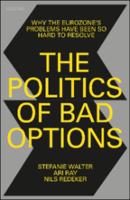The Politics of Bad Options
Why the Eurozone's Problems Have Been So Hard to Resolve
| dc.contributor.author | Walter, Stefanie | |
| dc.contributor.author | Ray, Ari | |
| dc.contributor.author | Redeker, Nils | |
| dc.date.accessioned | 2023-01-30T10:13:30Z | |
| dc.date.available | 2023-01-30T10:13:30Z | |
| dc.date.issued | 2023 | |
| dc.identifier | OCN: 1227044789 | |
| dc.identifier.uri | https://library.oapen.org/handle/20.500.12657/61000 | |
| dc.description.abstract | Why did the Eurozone crisis prove to be so difficult to resolve? Why was it resolved in a manner in which some countries bore a much larger share of the pain than other countries? Why did no country leave the Eurozone rather than implement unprecedented austerity? Who supported and who opposed the different policy options in the crisis domestically, and how did the distributive struggles among these groups shape crisis politics? Building on macro-level statistical data, original survey data from interest groups, and qualitative comparative case studies, this book argues and shows that the answers to these questions revolve around distributive struggles about how the costs of the Eurozone crisis should be divided among countries, and among different socioeconomic groups within countries. Together with divergent but strongly held ideas about the “right way” to conduct economic policy and asymmetries in the distribution of power among actors, severe distributive concerns of important actors lie at the root of the difficulties of resolving the Eurozone crisis as well as the difficulties to substantially reform European Monetary Union (EMU). The book provides new insights into the politics of the Eurozone crisis by emphasizing three perspectives that have received scant attention in existing research: A comparative perspective on the Eurozone crisis by systematically comparing it to previous financial crises, an analysis of the whole range of policy options, including the ones not chosen, and a unified framework that examines crisis politics not just in deficit-debtor, but also in surplus-creditor countries. | en_US |
| dc.language | English | en_US |
| dc.subject.classification | thema EDItEUR::K Economics, Finance, Business and Management::KC Economics::KCP Political economy | en_US |
| dc.subject.classification | thema EDItEUR::K Economics, Finance, Business and Management::KC Economics::KCX Economic and financial crises and disasters | en_US |
| dc.subject.classification | thema EDItEUR::J Society and Social Sciences::JP Politics and government::JPA Political science and theory | en_US |
| dc.subject.classification | thema EDItEUR::K Economics, Finance, Business and Management::KC Economics::KCL International economics | en_US |
| dc.subject.classification | thema EDItEUR::K Economics, Finance, Business and Management::KF Finance and accounting::KFF Finance and the finance industry | en_US |
| dc.subject.classification | thema EDItEUR::J Society and Social Sciences::JP Politics and government::JPS International relations::JPSN International institutions | en_US |
| dc.subject.classification | thema EDItEUR::1 Place qualifiers::1Q Other geographical groupings: Oceans and seas, historical, political etc::1QF Political, socio-economic, cultural and strategic groupings::1QFE EU (European Union) | en_US |
| dc.subject.other | euro crisis, Eurozone, adjustment, austerity, bailout, conflict, burden sharing, interest groups, current account, crisis politics, rebalancing, distributive conflict | en_US |
| dc.title | The Politics of Bad Options | en_US |
| dc.title.alternative | Why the Eurozone's Problems Have Been So Hard to Resolve | en_US |
| dc.type | book | |
| oapen.identifier.doi | 10.1093/oso/9780198857013.001.0001 | en_US |
| oapen.relation.isPublishedBy | b9501915-cdee-4f2a-8030-9c0b187854b2 | en_US |
| oapen.relation.isFundedBy | 06b5ddc2-657f-4fbf-95ff-eba3a6759fa7 | en_US |
| oapen.relation.isbn | 9780198857020 | en_US |
| oapen.pages | 320 | en_US |
| oapen.remark.public | Funder name: University of Zurich |

